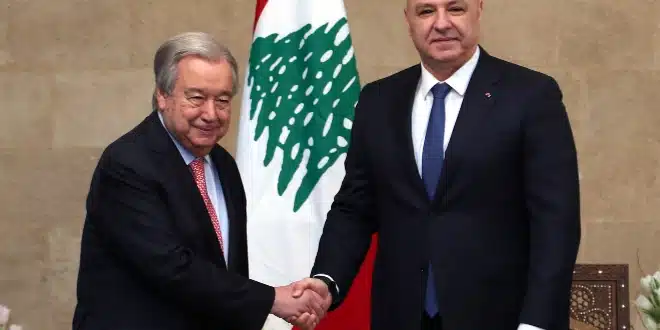President Joseph Aoun issued a strong appeal on Monday, urging Lebanese citizens and political factions to unite in a calm and responsible manner to shield Lebanon from the escalating turmoil in the region—particularly the recent sectarian clashes erupting in neighboring Syria.
A Message of Prevention and Responsibility
In his statement, President Aoun emphasized the urgent need to prioritize national stability over political divisions. “Our focus must be on safeguarding Lebanon,” he said, “because no party—governmental or civil—can withstand the devastating consequences of a new war.” His remarks come at a time when regional instability threatens to spill across borders, raising fears of renewed violence within Lebanon’s own communities.
Aoun reiterated that Lebanon must seize this moment as an opportunity to maintain its neutral stance, recalling the country’s successful efforts to remain uninvolved during the armed conflict between Israel and Iran earlier this year. During that period, Lebanon’s leadership worked to ensure the nation remained outside the line of fire, avoiding further strain on its fragile political and economic systems.
State Monopoly on Arms Draws International Support
The president also pointed to Lebanon’s recent commitment to consolidate military power exclusively under the authority of the state, suggesting that this strategy has garnered positive attention abroad. “International actors have recognized our decision to place all weapons under state control,” Aoun noted, signaling this as a foundational step toward long-term stability and institutional legitimacy.
This stance directly responds to ongoing concerns about the proliferation of arms among non-state actors, particularly in a region where foreign interventions and sectarian militias frequently destabilize domestic governance.
Looking Ahead: Caution, Reform, and National Consensus
President Aoun’s address reflects broader anxieties within Lebanon, a country already grappling with economic collapse, political gridlock, and a growing refugee burden due to regional crises. His call for national cohesion, though measured, underscores the delicate balance Lebanese leadership must strike between internal pressures and external threats.
As tensions in Syria and other parts of the Middle East continue to evolve, Aoun’s message may serve as a pivotal point for rallying domestic political will—aimed not at escalation, but at maintaining Lebanon’s hard-won, if tenuous, peace.


